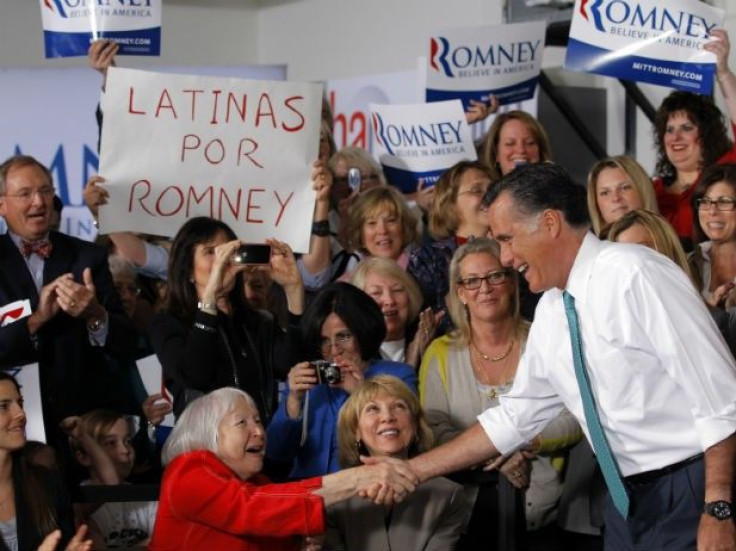Romney's Latino Woes Continue

Mitt Romney continues to trail far behind President Obama among Latino voters, imperiling his prospects to win a handful of swing states.
A new poll of Hispanic voters, conducted by The Wall Street Journal, NBC News and Telemundo, gave Obama a commanding lead of 61 percent to 27 percent. The president also enjoys a 61 percent approval rating and is looked on far more favorably than his Republican rival: 58 percent of Latinos have a positive perception of him versus 23 percent who view him negatively, compared to a 26 / 35 favorable/unfavorable split for Romney.
Romney's campaign is well aware of the pivotal role the Latino population, which constitutes a sizable chunk of the electorate in contested states like Nevada, Colorado and Florida, is poised to play in the 2012 presidential race. Romney himself told a private gathering of donors that his struggle to woo Hispanic voters spells doom at the ballot box come November.
But in order to surmount his Latino gap, Romney will need to contend with the Republican Party's deep unpopularity among most Hispanics. A broader sample of Latinos that was not just restricted to eligible voters found that a slender 22 percent saw the GOP positively against 40 percent who view the party in a negative light.
In the last couple of years, Latino perceptions of the Republican Party have been influenced by a raft of tough new state immigration laws modeled on an Arizona law that is currently before the Supreme Court. Romney has given those laws his imprimatur, praising a piece of the Arizona law as a model for the nation (he stopped short of a full endorsement) and earning the public support of Kansas Secretary of State Kris Kobach and former Arizona state senator Russell Pearce, who were instrumental in designing the Arizona law and formulating its premise of attrition through enforcement.
Romney also opposes pieces of legislation that would grant some legal relief to undocumented immigrants and enjoy broad support from Latinos. He has said he would veto the DREAM Act, a bill that would open a route to citizenship for undocumented immigrants who were brought to the United States as young children, joined the military or went to college and have clean criminal records. During the Republican primary, Romney joined other candidates in lambasting Texas Governor Rick Perry for signing a bill that offered in-state tuition to undocumented immigrants attending public universities.
Despite the risk of alienating some voters with those stances, Romney is appealing to Latinos by using the strategy that is central to his campaign: a relentless focus on the economy. Latinos have endured higher rates of foreclosure and unemployment as a result of the economic downturn, and Romney is positioning himself as the best candidate to lift their prospects.
In a Wednesday speech at an economic forum hosted by the Latino Coalition, Romney took a different approach. Rather than touch on immigration, Romney delivered a speech about education, promising reform in an area polls suggest is important to many Latino voters.
© Copyright IBTimes 2024. All rights reserved.











